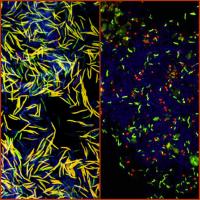About two million people in Europe suffer from chronic inflammatory bowel diseases, which are characterized by progressive tissue destruction and that often necessitate removal of sections of the intestine. The exact causes of Crohn's disease and ulcerative colitis, the most common forms of these diseases, are still largely unknown. In addition to genetic and environmental as well as lifestyle factors, a disturbed intestinal microbiota is responsible for triggering the disease. Complete recovery is often not possible. "If drug therapies fail, removal of parts of the inflamed intestine is currently the last treatment option," said Walter Reinisch, a gastroenterologist at the University Clinic for Internal Medicine III, Medical University of Vienna, and initiator of the study.
Fecal transplantation: an alternative therapy with a certain "yuck" factor
The idea of the transfer of fecal matter naturally causes some disgust. However, in many infectious and chronic diarrheas the intestinal microbiota is massively disrupted and it is therefore fecal transplantation can be used to restore the natural intestinal microbiota and thereby improve disease state. "Meta studies have shown that the controlled grafting of fecal transplantation from healthy donors is a safe and very effective treatment of acute diarrheal diseases caused by the pathogenic bacterium Clostridium difficile," said Sieglinde Angelberger, gastroenterologist at the University Clinic for Internal Medicine III of the Medical University of Vienna and author of the study: "this was the reason why we applied this therapy for the treatment of patients with chronic intestinal diseases."
Successive colonization by donor intestinal bacteria 
This is microscopic identification of the microbiota in healthy (left) and inflamed intestine (right) using specific gene probes. Intestinal inflammation lead to the displacement of supporting healthy bacteria such as...
"So far, it has not been sufficiently tested whether and how successful fecal transplantation is for the permanent settlement of microbiota from a healthy donor to a patient," said Alexander Loy of the Department of Microbiology and Ecosystem Research, University of Vienna. "That is why we have followed the composition of the intestinal microbiota of patients using modern DNA sequencing methods over a period of up to three months after treatment."
The intestinal ecosystem of each individual patient reacted very differently to the fecal transplantation. Intestinal bacteria of the donors were detected in the patients, but at different times and in different frequencies. "Although we don't know the mechanisms yet, repopulation of the gut by bacteria appears to analogous to succession in a forest after it is damaged in a storm," said microbiologist David Berry: "pioneer species colonize the deforested area, in this case the inflamed intestine, and alter the ecosystem in a way that lets other species colonize and eventually a complex ecosystem can be restored."
Cooperation between basic research and applied medicine
"Working with the Medical University of Vienna offered us an opportunity to translate fundamental science expertise from the project InflammoBiota to study the intestinal microbiota of patients," said Alexander Loy. The joint project InflammoBiota, which was dedicated to the study of immunology and the microbial causes of inflammatory bowel disease, was funded by the Austrian Genome Research Programme GEN-AU of the Federal Ministry for Science and Research.
Source : alexander.loy@univie.ac.at
 Print Article
Print Article Mail to a Friend
Mail to a Friend
